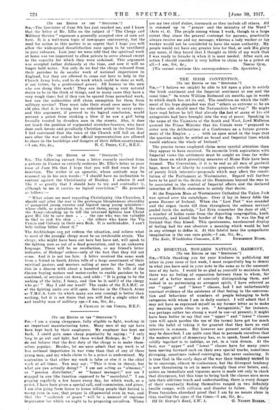[To IRE EDITOR Or THE " SPECTATOR.") am a young
clergyman, fully eligible to fight, working in an important manufacturing town. Many men of my age have been kept back by their employers. My employer has kept me hack. I could gain some cheap popularity by saying : " I only long to go out and fight, but these wicked Bishops, &c." But I do not believe that the first duty of the clergy is to make them- selves popular. Besides, let me once admit that my work is of less national importance in war time than that of any of these young men, and my whole claim to be a priest is undermined. My contention is that either my work is false or else it is the chief work at all times. You may say : "This is true in theory, but a hat are you actually doing? " I am not acting as "almoner," or " pension distributor," or " bazaar manager," nor am I engaged in any like function supposed to be " sacerdotal." I am praying regularly a few hours every day, for which work, as a priest, I have been given a special call, and commission, and grace. ETD also going from house to house telling people that hatred is wrong even in war, that prayer is all-powerful even in war, and that the " outbreak of peace " will be a moment of supreme importance for which we ought to be preparing ourselves. There are my two chief duties, inasmuch as they include all others. All is summed up in " prayer and the ministry of the Word " (Acts vi. 4). The people among whom I work, though to a large extent they share the general contempt for parsons, practically always receive me and my message; whereas a lady worker or lay worker would not be considered to have the same authority. My people would not have any greater love for God, or seek His glory any more, if they heard that I thought so little of my work that I was ready to forsake it when it is most needed. After such an action I should consider it very hollow to claim to be a priest at all.—I am, Sir, &c., Nemo Quo. [We cannot continue this correspondence.—En. Spectator.]


































 Previous page
Previous page